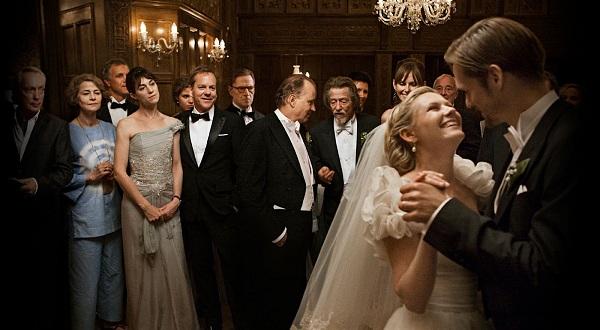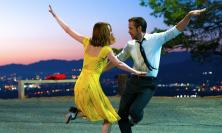Director: Lars von Trier
Starring: Kirsten Dunst, Charlotte Gainsbourg, Kiefer Sutherland, John Hurt
UK Release date: 30 September 2011
Certificate: 15 (136 mins)
Those familiar with Lars Von Trier and his previous work will know that he is not one to pussy-foot around subject matter and its execution. And whether one is a fan or not of Von Trier’s previous offerings, Antichrist or The Idiots, it is undeniable that his backlash against traditional narratives and American methods of filmmaking is captivating. But in his newest film the writer and director chooses uncharacteristically to utilise CGI to represent Melancholia, a beautiful but terrifying planet that is en route to collide with Earth bringing with it the extinction of all life. This is an interesting choice given the director’s previous involvement in ‘Dogme95’, an avant-garde movement in which filmmakers took a ‘Vow of Chastity’ which excluded, amongst other things, the elaborate use of special effects or technology. Although the director isn’t bound to this movement anymore, that is not to say Melancholia doesn’t show a change of direction in terms of his filmmaking.
Indeed, the first part of the film, titled ‘Justine’ is set at the glamorous wedding of Justine to her husband Michael at an expensive country hotel that is cut off, it seems, from the rest of the world. The young couple arrive late at the reception in good spirits, but when they are forced to take part in the suffocating pleasantries of the evening’s reception things begin to break down. Some amusing and pithy musings on life and social interaction arise in the midst of the ever-funny social occasion that weddings are. But this is all too much for Justine (she seems to suffer from clinical depression) who detaches herself from the gathering, and her mood becomes more distant and sad. The night continues until she is unable to hold together the semblances of normality, and she breaks off her brief marriage after a random sexual encounter with a guest at the wedding.
At the wedding we are introduced to Justine’s sister, Claire. Brunette Claire is the opposite to her blonde counterpart, Justine. This duality provides the main tension of the film. Whereas Justine is detached and at times reckless, Claire is pragmatic and cautious. Claire, as would be expected, is angry with Justine for breaking off the marriage. But the night after the wedding she has more to worry about as the attention shifts from the break-up of a relationship to the astrological wonder that is Melancholia. The planet is due to pass Earth in a couple of nights time but Claire, although comforted by her husband, John (Kiefer Sutherland) and his half-baked reassurances, is unable to find solace in his scientific hypothesis. She is haunted by the prophecies that predict that the planets may collide. In the film’s second half (titled ‘Claire’), the organised and pragmatic sister becomes panicked and desperate, striving to hold onto life at any cost.
As the film continues and the social fabric comes undone we are allowed to see Melancholia clearer and clearer. We also hear more and more from Wagner who soundtracks the planet’s journey with ‘The Prelude to Tristan and Isolde’,a piece of music that evokes desire, frustration and sadness, and is for me the real star of the film – but that’s a discussion for another day. The characters sit there as the hours pass, staring helplessly and in awe as they measure the increasing proximity of the planet. And so we see not just Melancholia the planet but also the characters’ own melancholia in relation to the planet. John, the materialist scientist is excited by his readings, watching with an air of smugness when the predictions seem initially to be correct. Claire’s disposition is one of perpetual worry, clinging on to others for reassurance. Her child, Leo’s (Cameron Spurr) reaction is perhaps the one with which we can empathise the most: it is one of amazement that this beautiful planet is there, but also one of fear. After all, what is impressive is at times terrifying. Justine’s reaction is one of wonder, excitement and almost sexual thrill as she bathes in Melancholia’s blue light. She seems to relish in the idea that this extinction is what we all crave. ‘The earth is evil… we don’t need to grieve for it,’ she says. But Claire cannot accept this statement. Human arrogance gets the better of her even when she knows that they are doomed – she still wants control, and even when the planet is destined to hit she suggests almost comically that they sit back and watch it approach with a glass of red wine in hand.
Von Trier has without a doubt created an incredible spectacle. Melancholia is impressive to look at and listen to, and the film does look at ideas that don’t get looked at often in western cinema. But at the end of the film, I didn’t care really that the characters had died. They were all deplorable, cowardly, selfish and desperate. Perhaps that’s what Von Trier is saying; perhaps we are that. The film then is not sad at all – but maybe it is lacking something because of that. This is the real tragedy of the film, that the characters are unable to connect with one another. There is a strange catharsis when we watch as Melancholia swallows the characters up, bringing about, as I’m sure Von Trier has dreamt about, the extinction of all things.
Michael Bateson-Hill
![]() Visit this film's official web site
Visit this film's official web site






